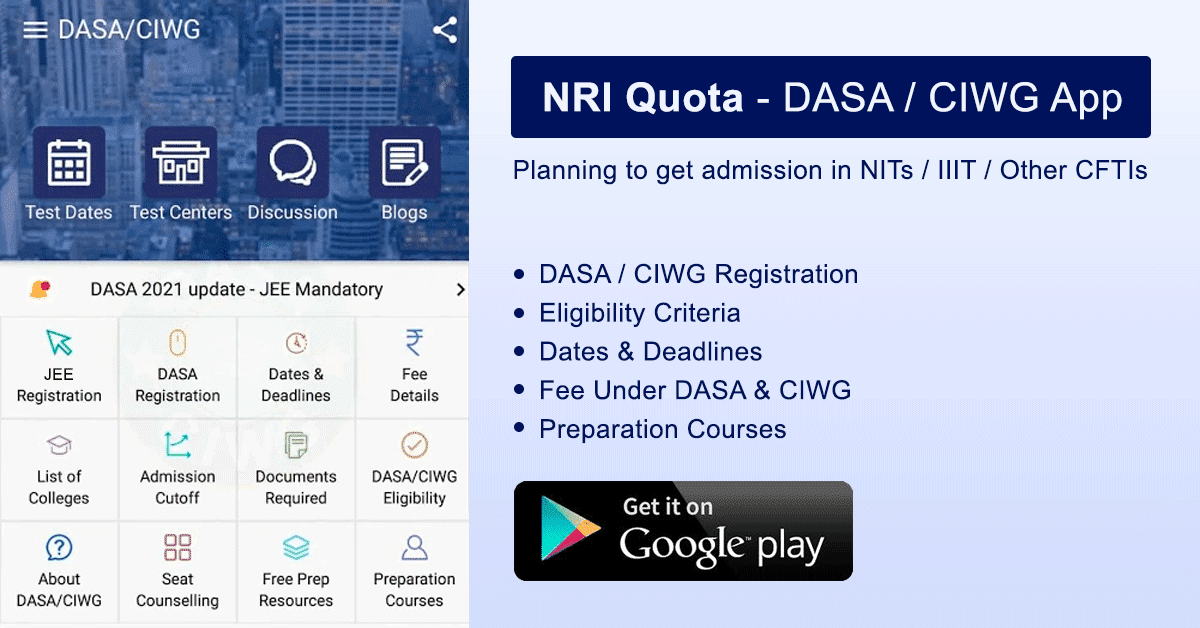DASA CIWG Scheme is a reservation scheme for NRI, OCI and PIO students in Indian Enginerring College only. There are list of Colleges only which are know as CFTIs in India which accepts DASA / CIWG Quota for NRI Students.
Under DASA / CIWG Scheme (Quota) students are allowes to write JEE Main Test and on the basis of their score they can get admission in these CFTIs in India.
Seats are reserved under CFTIs colleges in India specifically for DASA / CIWG students. Here couple of points you need to know to undestand how DASA / CIWG Quota is going to be helpfulf for you. Below are the points that will help you understand further.
- About DASA / CIWG Scheme
- DASA / CIWG Application Procedure
- DASA / CIWG Dates & Deadlines
- DASA / CIWG Eligibility For NRI Students
- DASA / CIWG Fee For Admission
- DASA / CIWG Participating Colleges
- DASA / CIWG Score Needed
- DASA / CIWG Seat Matrix
- DASA / CIWG Admission Procedure
- DASA / CIWG Admission Quota
- DASA / CIWG Documents Needed (Parent / Student)
- DASA / CIWG Contact Information
DASA / CIWG & JEE FAQ 2021-22
Answer: Yes, DASA Scheme as well as its subset (the CIWG Scheme) will be available for admissions in the academic year 2021-22.
By applying under these scheme, students can take admissions in NITs, IIITs, CFIs & SPAs. The only difference from 2021 is that JEE Main Rank will be considered valid, not SAT 2.
Answer: No. As notified on the official website of DASA, SAT 2 Scores or SAT Subject Scores will no longer be valid from 2021 onwards to take admissions under DASA & CIWG Scheme.
Answer: The benefit with JEE is that the students who happen to be eligible for JEE Advanced (decided on the basis of JEE Main Results), can take JEE Advanced Exams to try for admissions in IITs, the most premier engineering Institute in India.
The same wasn’t possible with SAT 2 because IITs dont intake students on the basis of SAT 2 Scores. If students can’t clear JEE Advanced, they can still take admissions in NITs, IIITs, CFIs & SPAs on the basis of JEE Main Rank.
The eligibility criteria for DASA 2021 & CIWG 2021 will remain the same as it is for 2020 or 2019. There are no changes in the eligibility criteria yet announced officially by DASA. Visit here, to check your DASA Eligibility.
Answer: NRI, PIO, OCI Students who are in grade 11th (in 2019) and will be appearing for grade 12th final exams in 2021, are eligible for JEE 2021 to apply under the DASA 2021.
If you are in grade 12th (in 2019), you must be appearing for grade 12th final exams in 2020. Hence you will be giving SAT 2 for applying under DASA 2020.
If in case you wish to take an year extra just for exam preparation, then the year will be 2021 & hence you will have to take JEE Main to apply under DASA 2021.
Ans: Because DASA released this notification on 4th of April on its official website (https://dasanit.org/). There are 100% chance that this notification is a final one.
No detailed circular has been released as of now but as soon as any such updates arrive, you can find them on our website.
Answer: This is completely unpredictable. But there seems to be less chance that it will be withdrawn. The NRI, PIO, OCI Students who wish to apply for DASA / CIWG 2021 (& years after 2021) must start preparing for JEE Main.
Answer: No changes have been made in the qualifying exam criteria for DASA 2021. Students must have a minimum of 60%, or equivalent, in Grade 12 Exams (of their respective boards) & must have successfully completed Maths, Physics and one of the subjects from (Chemistry, Biotechnology, Computer Science, Biology) in Grade 11th & 12th.
Answer: The applicants must be thoroughly aware of the syllabus & pattern i.e. revolving around the NCERT textbooks for class 11th & 12th.
This is because JEE Syllabus is based on the NCERT Text books. The students must also practice using various reference books /online test series/ JEE coaching online/ mock tests/ previous years papers in order to crack JEE 2021 for applying under DASA 2021 or CIWG 2021.
Answer: The JEE cutoff varies every year because of the percentile system. Hence, the exact cut off cannot be mentioned. Every year, JEE cutoff is announced at the time of JEE Result Declaration & it is valid only for that particular year.
Answer: Based on the tough competition students have in India, it is very necessary for students to make extra efforts to clear JEE Main or Advanced. In India, when science students enter grade 11th, they take up tuitions or coaching to help them prepare for JEE Main.
Because the JEE Syllabus is based on NCERT Textbooks which are used in Grade 11th & 12th, it also helps them prepare for their school exams / board exams. Ideally, 2 years of JEE preparation (coaching, previous 40 years questions practice, test series) is needed for students who want to clear JEE Main.
Hence, it is highly recommended for NRI , PIO, OCI Students to take JEE Coaching if they wish to secure a seat in NITs, IIITs, CFIs or SPAs under DASA / CIWG Scheme 2021.
Answer: Whether you are an NRI Student residing in UAE, Saudi Arabia, Oman, Singapore, or anywhere in the world,
Testprepkart has been providing online coaching for JEE & various other entrance exams with proven results. Our online classes are live & completely interactive encouraging the interactions between students and the teachers. We also equip our students with up to date study materials, online test series, doubt clearing sessions. You can book a free demo session with us.
Answer: Observing this pattern of how DASA has been allowing NRI Students to submit their SAT 2 scores through their college board account, there are high chances that from session 2021-22 onwards, NRI Students might be made to submit their JEE Main Rank to DASA through their JEE Main account.
For specific queries on DASA / CIWG – Please share your query here: DASA / CIWG Queries
Difference Between the NRI, PIO & OCI:
DASA / CIWG For NRIs:
Non-resident Indian students are also referred to as Indian Diaspora, are the people of Indian birth or descent who live outside of the Republic of India. As per the Ministry of External Affairs report, there are approximately 30.8 million Indian diasporas residing outside India.
Non-Resident Indian India has the highest diaspora population in the world with more than 15.6 million according to the United Nations Department of Economic and Social Affairs.
Income Tax Act considers an individual as a Non-resident Indian if he/she fulfills the following requirements 'Non-Resident Indian' is an individual who is a citizen of India or a person of Indian origin and who is not a resident of India.
Thus, in order to determine whether an individual is a non-resident Indian or not, his residential status is required to be determined under Section 6. As per Section 6 of the Income-tax Act, an individual is said to be non-resident in India if he is not a resident in India and an individual is deemed to be resident in India in any previous year if he satisfies any of the following conditions:
-
If he is in India for a period of 182 days or more during the previous year or
-
If he is in India for a period of 60 days or more during the previous year and 365 days or more during four years immediately preceding the previous year.
However, condition No. 2 does not apply where an individual being a citizen of India or a person of Indian origin, who being outside India, comes on a visit to India during the previous year.
A person shall be deemed to be of Indian origin if he, or either of his parents or any of his grandparents, was born in undivided India.
DASA / CIWG For PIOs:
The Person of Indian Origin (PIO) is also called Overseas Indians. They are individuals who are Indians at birth or descent of Indian origin who live outside of the Republic of India.
The Persons of Indian Origin means a foreign citizen (except a national of Pakistan, Afghanistan, Bangladesh, China, Iran, Bhutan, Sri Lanka and/or Nepal), who
-
At any time held an Indian passport or
-
Either of their parents or grandparents or great-grandparents were born and permanently resident in India as defined in Government of India Act, 1935 and other territories that became part of India thereafter provided neither was at any time a citizen of any of the aforesaid countries (as referred above) or
-
Is a spouse of a citizen of India or a PIO
PIO Card:
The Persons of Indian Origin Card was a form of an identification card issued to the Person of Indian Origin who held a passport in a country other than Bangladesh, China, Afghanistan, Bhutan, Nepal, Pakistan, and Sri Lanka.
The PIO Card program came into effect on September 15, 2002. On January 15, 2015, the Person of Indian Origin card scheme was withdrawn by the Government of India and it was merged with the Overseas Citizen of India (OCI) card scheme.
Currently, all the PIO cards are treated as OCI cards. PIO cardholders will get a special stamp on their existing PIO card, stating "lifelong validity" and "registration not required", thus making them equal to the existing OCI cards.
DASA / CIWG For OCIs:
The Overseas Citizenship of India (OCI) is an immigration status authorized for a foreign citizen of Indian origin to live and work in the Republic of India indefinitely. The OCI was introduced in response to demands for dual citizenship by the Indian diaspora, particularly in developed countries.
It was introduced by the Citizenship (Amendment) Act 2005 in August 2005. It was launched during the Pravasi Bharatiya Divas Convention held at Hyderabad in 2006.
Overseas Citizenship of India To apply for and use an OCI document, a holder must be a citizen of and hold a passport of another country, except that of Pakistan and Bangladesh.
Before February 2015, passengers holding OCI cards were required to carry the passport which contained a lifetime visa while traveling to India. This requirement was done away with during 2015, and now the OCI cardholders no longer require the visa sticker passport. The OCI card (the blue booklet) in conjunction with a current valid foreign passport is sufficient to travel to and from India.
TestprepKart offers guidance and a range of resources to help students looking for schools and financial assistance.
Quick Connect: +91 800085231013 (Toll Free) Email: [email protected]
Useful JEE Main Links You Should Not Miss:
JEE Details You Should Not Miss:
JEE Coaching Centers:



Leave a Reply